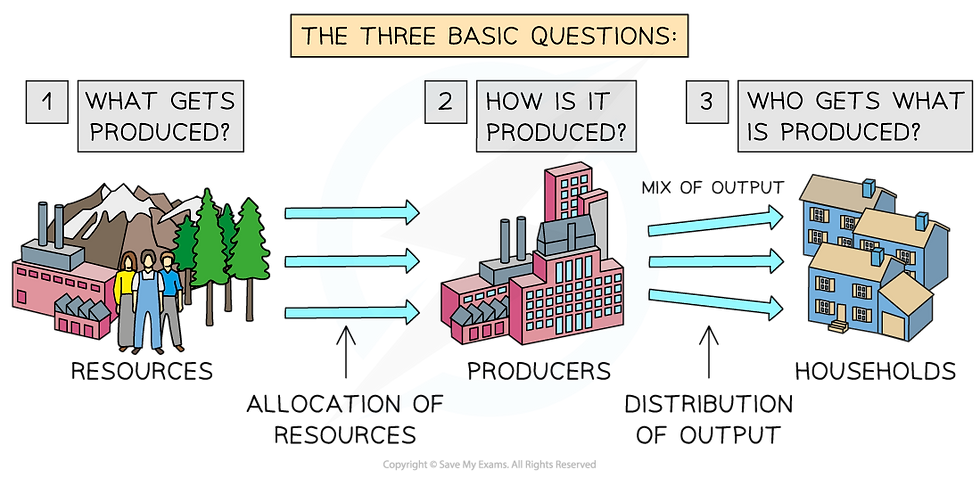Different Economic Systems
In order to solve the basic economic problem of scarcity, economic systems emerge or are created by different economic agents within the economy.
-- These agents include consumers, producers, the government, and special interest groups (e.g. environmental pressure groups or trade unions).
--Any economic system aims to allocate the scarce factors of production.
The three main economic systems are a (free) market system, mixed economy, and planned economy.
How the three questions are answered determines the economic system of a country
Economic decisions need to be made to answer three important questions:
1. What to produce?
As resources are limited in supply, decisions carry an opportunity cost. Which goods/services should be produced? e.g. better rail services or more public hospitals?
2. How to produce it?
Would it be better for the economy to have labour-intensive production so that more people are employed, or should goods/services be produced using machinery?
3. For whom are the goods and services to be produced?
Should goods/services only be made available to those who can afford them, or should they be freely available to all?
How These Questions Are Answered Determines the Economic System
How a Market System Works ?
A market system works to allocate scarce resources efficiently, purely through the forces of demand and supply (the price mechanism).
-- There is no government intervention in a pure market system (no taxes or government spending).
-- Markets can be physical (e.g. McDonald's) or virtual (e.g. eBay).
The price mechanism is the interaction of demand and supply in a free market
-- This interaction determines prices, which are the means by which scarce resources are allocated between competing wants/needs.
The price mechanism fulfils several functions in an economy:
--Prices allocate (ration) scarce resources.
When resources become scarcer the price will rise further. Only those who can afford to pay for them will receive them.
If there is a surplus, then prices fall and more consumers can afford them.
--Prices provide information to producers and consumers where resources are required (in markets where prices increase) and where they are not (in markets where prices fall).
--When prices for a good/service rise, it incentivises producers to reallocate resources from a less profitable market to this market in order to maximise their profits.
Falling prices incentivise reallocation of resources to new markets
Market Equilibrium and Disequilibrium
Equilibrium in a market occurs when demand = supply.
At this point, the price is called the market clearing price.
--This is the price at which sellers are clearing their stock at an acceptable rate.
A graph showing a market in equilibrium with a market clearing price at P and quantity at Q
Any price above or below P creates disequilibrium in this market
--Disequilibrium occurs whenever there is excess demand or supply in a market.









1. What is meant by market system and explain how it works.
2. Explain equilibrium and disequilibrium & how they occur.
3. What is price mechanism?
4. What are the key features of the price mechanism?
What are the main characteristics of a market economy?
Can you explain the concept of perfect competition within a market system?
What are the differences between a market economy and a planned economy?
How do prices get determined in a market system?
What role do entrepreneurs play in a market economy?
What are some examples of market systems in the real world?
How does supply and demand influence a market system?